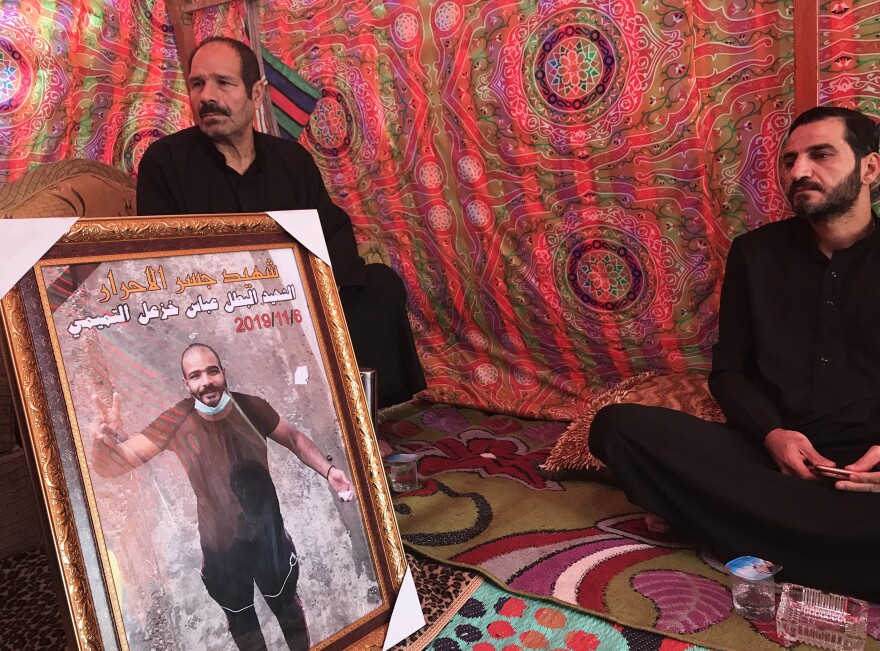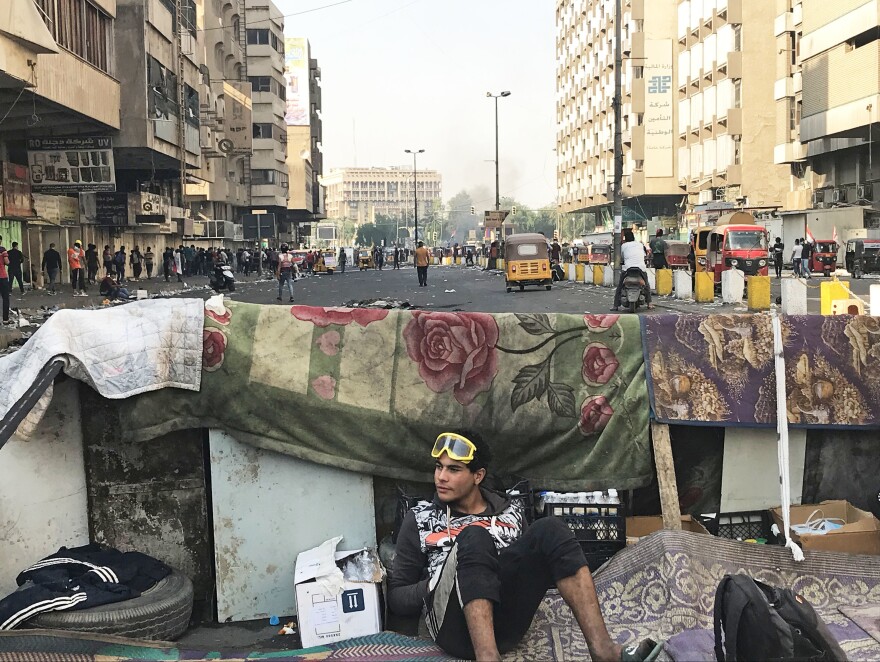Khazaal Salih sits in a tent next to a photo of his son, just back from the framing shop. In the gold-framed photo, Abbas wears a disposable blue surgical mask to protect him from tear gas. He's smiling and raising his fingers in a victory sign. At the top of the photo is the date — Nov. 6, 2019 — when the young man was killed by Iraqi security forces during an anti-government protest.
Abbas, who was 25, had fought for almost three years against ISIS with an Iran-backed Iraqi paramilitary group. His father, a retired Iraqi army corporal, says he never imagined that his son would die this way — one of more than 315 protesters killed in anti-government demonstrations since October.
"He was unemployed and there was no work for him. I said, 'Where are you going?' He said, 'I am going to go with the protesters, with the poor, with those dying of hunger.' "

Abbas went out every day for almost two weeks. His family, including the sisters who raised him after their mother died, barely saw him. And then, two weeks ago, his father received a phone call telling him a young man named Abbas, thought to be a doctor, had been killed.
Abbas wasn't a doctor, but he'd had first aid training and was wearing a white lab coat. When he was shot dead near a bridge in central Baghdad, he'd been helping treat an injured protester.
"By God, my son did nothing wrong," says his father. "He didn't steal anything. He helped save people and you killed him ... If you want to scare the protesters, take them to prison or shoot them in the leg or anywhere else. Don't kill them."
Salih, 70, says he originally told Abbas not to go join the protests — that it was dangerous. But he eventually gave his blessing — even when Abbas came home with shrapnel wounds — because Iraq's revered Grand Ayatollah Ali al-Sistani and other Shiite religious scholars supported the peaceful protests.

Salih's support for the religious scholars hasn't wavered. But he curses his country's prime minister and the security forces he is supposed to command.
"Any soldier takes orders from the commander," he says. "Soldiers who didn't have orders to shoot wouldn't shoot that way."
And he curses Iraq's parliament and the political parties that he says promise everything at elections and deliver nothing.
A funeral banner praising Abbas as a martyr hangs in an alley leading to the Salihs' modest home in the mostly middle-class Shaab neighborhood, near Sadr City in Baghdad.
There is little work — particularly for young people who don't have the money to bribe their way into a job. Abbas dropped out of school after seventh grade to help support his family. When ISIS invaded in 2014, he became a platoon leader and a paramedic with Kataib Hezbollah, one of Iraq's main Iran-backed militias.
In the hospital where Salih's body was taken, his father kissed his son's head and his feet. The family buried him in the holy city of Najaf.
A nurse at the hospital who saw Salih's body on the night he was killed tells NPR he had been shot in the chest with a rifle.
One of Salih's sisters shows us a photo on her phone, taken in the hospital. It shows her brother lying dead, with wounds on his chest and neck. In a video taken by protesters, Salih lies lifeless on the road after being shot. He wears a white lab coat over a blue T-shirt covered in blood.
Iraq's defense minister denies that Iraqi security forces are deliberately killing protesters. The country's military spokesman, Gen. Abdul-Karim Khalaf, has denied that Iraqi forces are using live ammunition.

Near Baghdad's Tahrir Square, NPR finds the medic who was with Salih when he was shot. He is slumped against a concrete wall, temporarily deafened by a sound cannon used to disperse protesters. The medic, who says he left the Iraqi army to join the protesters, asked that his name not be used for fear of being arrested.
Once he's recovered from the effects of the sound cannon, he shares his recollection of what happened on Nov. 6.
"We were treating a wounded protester," he says. "I asked a major with the security forces to stop shooting so we could treat him and he said, 'OK, finish.' "
But another officer opened fire, he says, and shot Salih in the neck and the chest.
He says he wishes he would have died instead.
"To be killed is a victory," he says.
A physician, who also did not want to be identified for fear of arrest, says security forces are deliberately targeting medical volunteers helping the wounded.
"I was injured the first day of the protest because I was wearing a lab coat," he says. "I took it off and threw it from the top of the bridge."
In Iraq's oil-rich south, protesters have been demonstrating for almost two years against poverty, a lack of jobs, rampant corruption and Iranian influence. In October, these protests spread to Baghdad. An Iraqi government report last month said 149 people, most of them protesters, had been killed and thousands wounded in just two weeks of demonstrations.
It said the government would investigate and punish those responsible. No one has been publicly brought to justice since.
Protesters are demanding an entirely new political system. Many say they want to directly elect a president. At a bare minimum, they want the current government to fall. Prime Minister Adel Abdul-Mahdi promised to resign last month, but now appears to be planning to stay.

In Tahrir Square, where the recent anti-government demonstrations started, protesters have turned the square into a mini-city with a library, wall art and free food. But on the streets leading to bridges that the protesters have been trying to retake from security forces, it looks like a war zone.
Near Khilani Square, a few blocks away from Tahrir Square, the crack of live gunfire rings out as a crowd of young protesters pushes forward. The protesters run, some of them in bare feet, to hide behind buildings. Two well-dressed women, who have rushed out of their homes carrying white poodles, join the fleeing crowd. When the tear gas dissipates, the protesters surge forward again.
The demonstrations are overwhelmingly peaceful, but with the rising number of deaths and injuries of protesters, that has begun to change. Two teenagers stand in an empty road near Khilani Square, readying glass bottles filled with gasoline to light and throw.
"It's for self-defense," one boy says.
Another boy holds a slingshot. He says he plans to use it to hit security forces in the eye.
Ambulances speed by, carrying wounded protesters.
"They are using real bullets and killing us," says an unemployed computer science graduate from the south of Iraq, volunteering at a medical station. "They put masks on their faces so we don't know who they are, but now we know what they want. They want to kill us to stay in government so they can keep stealing."
To try to suppress the protests, the government has been cutting off the Internet for days at a time. Away from the protests' front lines, young men pass around phones with gruesome videos showing those killed by bullets or tear gas canisters. All of the dead are considered martyrs.
Most of the protesters, young and poor in an oil-rich country, feel they've gained nothing in the 16 years since Saddam Hussein was toppled. Now they feel they have nothing to lose.
Copyright 2021 NPR. To see more, visit https://www.npr.org.



